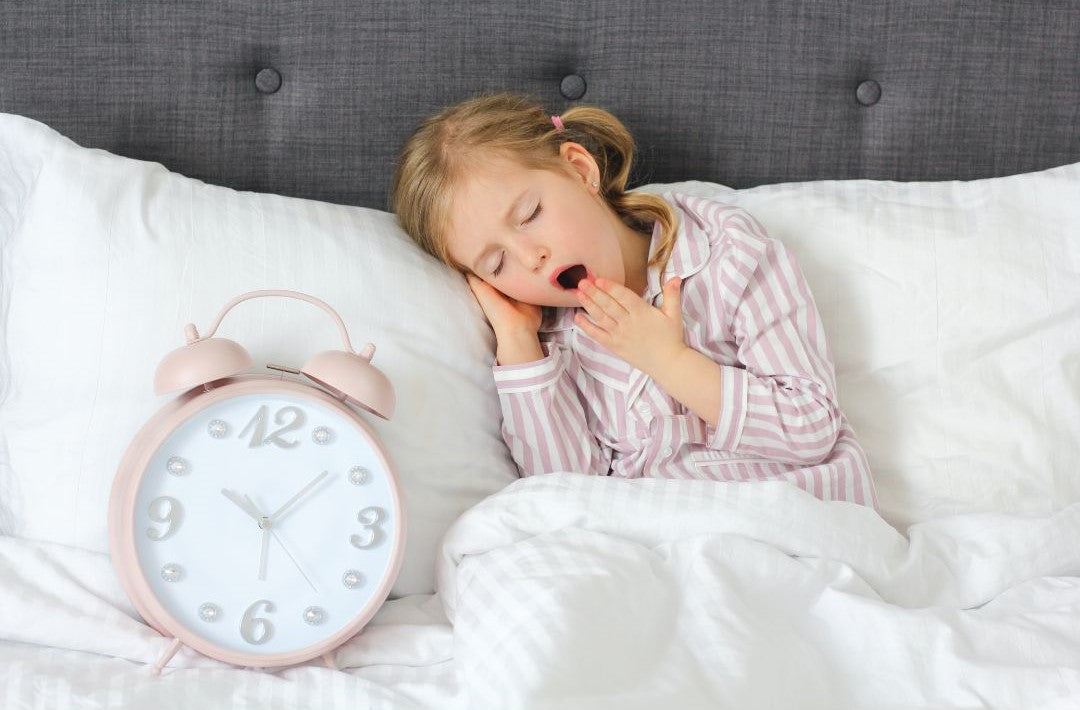When you become a parent, you will quickly notice that every baby is different--hitting milestones at different months, having their own personalities, and creating their own routine, especially when it comes to sleep. You may have heard that when babies are born their time clock is a little switched up, with nights being switched with days. But what happens when they outgrow that newborn phase and still struggle to establish a regular sleep schedule? They need sleep to grow; and we sure need them to sleep too! So here are some helpful ideas to get your kids to sleep!

First, find out why they aren’t sleeping.
- Are they excited about an event coming up?
- Are they nervous about something?
- Are they sick or in pain?
- Did they already have a long nap today?
- Has there been a change--new room or a new routine?
All these and more can be contributing factors as to why they aren’t sleeping. If they’re feeling anxious or excited, validate their feelings. Encourage a calming practice that you can do together, like simple yoga moves or breathing exercises. Below are more tips to help encourage good sleeping. Whatever you choose to do, start off gradually, and remember that it may or may not change over night.
For Infant and Toddlers
It can take time for babies and toddlers to sleep well at night. If your baby or toddler is already doing this, then great, you're ahead of the game! If not remember to think about what can be keeping them up
- Teething
- Sleep regression
- Feeling sick

1. Create a sleep routine.
If you don’t think these work, I'm here to tell you that they really can. Babies love a routine. It helps their bodies and minds create a pattern of what’s to come and whatto expect during this time of day. Sometimes babies will create this routine for themselves, but it's also helpful for you to implement a set schedule at bedtime and naptime.
Do the same consistent actions every time to signal to your baby that it is time to sleep. This can include feeding, singing to them, rocking them back and forth, or reading a story. Keep it simple but consistent.
There are many sleep training exercises and programs that you can try to find out what works best for you and your baby.
2. Put your baby in bed while they are drowsy but awake.
It is tempting to rock your baby completely to sleep in your arms before placing them in their crib, but putting them down while they are still awake will actually help them associate bedtime with the process of falling asleep. This will also help them learn to self soothe and put themselves to sleep, rather than relying completely on you.

3. Buy a sleep sack, swaddle, or weighted blanket.
I can personally share my love for these. Most babies love being snuggled up and secure. Sleep sacks and wraps also keep their hands and arms in place so they aren't moving constantly around and removing their own pacifiers or grabbing their face. Weighted blankets have been proven to applying deep-pressure stimulation, which can increase melatonin to help sleep quality.
4. Keep bedtime positive.
Let your child know that sleep is not a punishment. With my oldest child, we bought a special clock that turned a certain color when it was bedtime and when it was time to get up. He could choose these colors and even have a fun sound and facial expressions that went along with it. With positive reinforcement, you can make bedtime a little game--if they listen to the fun clock or get ready for bed without any problems, they will get a small reward.
5. Add a comfort item.
This can be their favorite stuffed animal, a cozy blanket, or a pacifier (remember not to put extra stuffed animals or toys in an infant's crib). These items help give your little one the soothing and comfort they need to help put themselves to sleep.

For Older Kids
6. Create a sleep schedule.
Create a picture chart of your child's sleep schedule. It can include: bathing, brushing teeth, reading a book, and then bedtime. This will help their little bodies create a pattern and eventually learn that when doing these tasks, bedtime is near and it's time to wind down for the night. This can also be fun for toddlers as well. Having a fixed bedtime can help set their biological clock so their bodies learn to expect sleep at the same time each night. It's also wise to give them a warning that bedtime is coming. Let them that you'll be starting the bedtime routine in 20 minutes so they won't be surprised or upset when the time comes. Preschoolers need 10 to 13 hours or sleep, so make sure you set an early, consistent time for them to go to bed each night, ensuring they get the all the rest their little bodies need.

7. Create a good environment.
You've made your own bedroom a comfy haven for resting, so do the same for your child. Invest in blackout curtains or strips to keep the room dark. Have a sound machine to play light background noise. Make sure their room is at a comfortable temperature and that their bedding is soft and clean. If your child is afraid of the dark, you can plug in a simple night light to ease their fears. Their bedroom should be a place where they feel safe, secure, and as comfortable as possible.
8. Have them relax before bedtime.
Kids have a lot of energy to burn off during the day. And having them run and jump and play will definitely help them fall asleep easier. However, if your child has been active, doing a lot of jumping and running and playing immediately before bed, it can be hard to calm them down to go to sleep. Encourage physical activity, but try to finish up the rambunctious playing at least an hour before bedtime. Instead, let their bodies slow down with calming activities like reading, bathing, or playing with puzzles. You should also turn off screens one hour before bedtime to help their brains be calm enough to fall asleep.
9. Avoid sweets and caffeinated drinks.
Candy, soda, cookies, and treats all have ingredients that boost energy, so by cutting these items right before bedtime, you will minimize your child's trouble falling asleep.
These are just a few ways to help your kids enjoy bedtime and fall asleep easily. Of course, you will find that what works for one kid may not work for the other. Each child is different, so each approach to sleep can be different, and that's okay. There are many reasons why your kid can be having a hard time falling asleep, try to communicate as much as you can with them, or be aware of their environment and daily activities. Talk to your pediatrician if you feel you've hit a dead end.
Remember that these sleep troubles won't last forever. This is a struggle right now, but you can learn together how to overcome it and soon they will be sleeping happily on their own.
Don't forget to let us know what has worked for you and your child. We love hearing from you!





